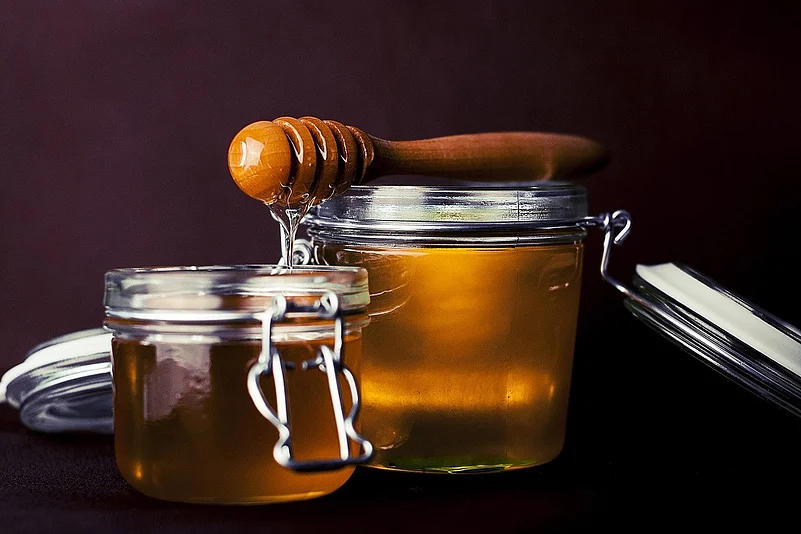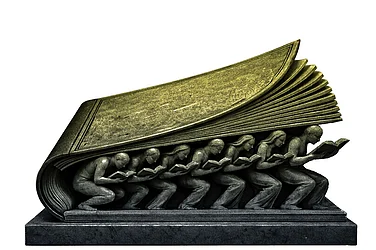An investigation by the Centre of Science and Environment has everyone asking one question – how safe is your honey? The shocking answer betrays a host of complexities; revealing a saga much older, pervasive, and nefarious than the industry might be letting on
On December 2, the public interest think-tank CSE broke ‘Honeygate’ – a food fraud allegedly beguiling consumers and helping companies maximise profits. Almost all honey brands sold in Indian markets, including trusted names like Dabur and Patanjali, were found to be laced with high amounts of sugar syrup, it revealed. A graver cause for concern that emerged in tandem was of the Indian regulation standards’ failure to detect this adulteration.
“It is a food fraud more nefarious and more sophisticated," the CSE report stated.
The research revealed there is a surfeit of sugar syrup found in most of the honey brands sold in the market. These syrups, imported from China and now increasingly being produced in India, are designed to bypass the regulation tests set up by FSSAI. This intricate web is impacting the health of consumers, the livelihood of beekeepers, and the existence of honey bees.
The findings are tinged with urgency when viewed in the backdrop of a global health crisis. Market analyst Nielsen reported in March 2020 that honey consumption – a household staple -- has gone up by 35 per cent during the pandemic. Considered a healthy addition to the diet, it was being used as an alternative to artificial sweeteners or with water to boost immunity.
The investigation, however, defangs the idea of honey’s inherent goodness. "[It is] more damaging to our health than perhaps anything that we have found till now…
"Instead of honey, people are eating more sugar, which will add to the risk of Covid-19. Sugar ingestion is directly linked to obesity, and obese people are more vulnerable to life-threatening infections,” said Sunita Narain, Director General of CSE, in a press release.
Spokespersons from Dabur, Patanjali, and Zandu have denied these allegations and maintain that production processes meet all regulatory guidelines issued by the Food Safety and Standards Authority of India (FSSAI). On December 4, the researchers met with FSSAI Chairperson Rita Teotia and chief executive Arun Singhal to discuss the findings CSE’s investigation into honey adulteration yielded. It has also sent its transcripts, research evidence, and findings to FSSAI for further deliberation.
What was the investigation about?
Over the last few months, CSE tested a total of 13 honey brands selling raw and processed honey. Eight of these were big brands selling processed honey and five were niche brands; four out of the five were selling raw honey. The samples were purchased during August to November this year from Delhi retail stores and online platforms and sent to two laboratories -- one in Gujarat and a renowned food testing lab in Germany.
The 13 samples were first tested at the Centre for Analysis and Learning in Livestock and Food (CALF) in Gujarat's laboratory for the stipulated tests of purity. The same brands were then tested in Germany's labs, which used a global parameter -- called the Nuclear Magnetic Resonance -- to check for modified sugar syrups. NMR is an advanced testing parameter that can detect adulteration with modified sugar syrups, which may otherwise go undetected. The Indian government mandated it in August 2020 for all honey exports to the US.
(Un)healthy honey
“What we found was shocking,” said Amit Khurana programme director of CSE’s Food Safety and Toxins team. According to him, 77 per cent of the samples tested were found to be adulterated with sugar syrup, and the Indian standards for screening the sugar usage had glaring loopholes.
In the Indian lab, CALF, at the National Dairy Development Board in Gujarat, almost all top brands (with the exception of one) passed the tests of purity. A few smaller niche brands reportedly failed the test that detects basic adulteration.
When the brands were tested using Nuclear Magnetic Resonance tests in Germany, the results were more alarming. Almost all big and small brands performed negatively on the test which would show the quantity of modified sugar syrups that go into their production. Out of the 13, only three passed the NMR test -- these include Saffola, MarkfedSohna and Nature's Nectar.
While sharing results with the FSSAI, CSE explained that the currently available tests (including isotope ratio) were "unable to detect the cheap and readily available modified sugar syrups in honey." NMR as an advance test was thus used as a surveillance tool to detect the sugar syrup and if it would bypass purity tests in Indian laboratories.
Notably, while Dabur and other brands passed the Indian honey adulteration tests, they were found to be adulterated in the NMR tests -- revealing that the Indian parameters of assuring honey purity fail to detect the rampant adulteration because the Chinese sugar syrups used are designed to bypass these standards.
“…adulterated samples with 25 per cent and 50 per cent sugar syrup passed the test of purity. In this way, we confirmed that sugar syrups exist that can bypass the 2020 FSSAI standard for honey.
“It shows how the business of adulteration has evolved so that it can pass the stipulated tests in India. Our concern is not just that the honey we eat is adulterated, but that this adulteration is difficult to catch,” Khurana said.
The what, who and how of sugar syrup
Questions that subsequently rise are: what is in the syrups and where are they coming from? Murmurs on the ground were such: honey was being mixed with sugar syrup, and this syrup made from crops such as rice was capable of passing all laboratory tests. This included India’s C3 and C4 stipulated testing.
The range of sugar syrups used for adulteration is extensive in its reach. Last year, FSSAI had issued a directive saying golden syrup, invert sugar syrup, and rice syrup were being used for adulterating honey. CSE’s findings showed that sugar syrups were being sold under ‘fructose’ or ‘glucose syrups -- including rice fructose syrup, tapioca fructose syrup, golden syrup fructose syrup, amongst others.
Chinese imports have further played a key role in diluting honey products. Sonal Dhingra, one of the investigators and deputy manager of CSE's Food and Toxins Unit, tells Outlook that out of the 11,000 tonnes of fructose syrup imported into India in the past few years, the bulk of it -- accounting for almost 70 per cent -- was coming from China.
China was evidently shoring up import quantity of sugar syrups, which were designed in such a way that they can pass Indian purity tests. These modified sugar liquids were dubbed as “all pass” syrups.
“We found that certain Chinese portals such as Alibaba, OkChem, Tradewheel featured syrups that claimed they could pass the honey adulteration tests such as C3, C4, TMR, SMR, oligosaccharides, and in some cases also NMR,” the report also mentioned.
The game, Amit Khurana said, is to beat the test that can detect C3 sugars. They found that honey brands with adulterations levels as high as 80 per cent were passing all stipulated tests. To prove that modified sugar syrups were being used to adulterate honey, CSE posed as a honey retailer and asked for syrups that could bypass the Indian purity tests.
The Chinese company sent a sample of the syrup to CSE, which was delivered under the category of 'paint pigment' to get it through customs. The same Chinese companies that were selling fructose syrups capable of overriding C3 and C4 tests were exporting syrups to India.
These companies have also reportedly sold the technology for the bypass syrup in India.
“We have heard Chinese companies have helped set up sugar syrup factories in India. One prominent trader from Saharanpur, speaking on condition of anonymity, divulged that he heard Chinese companies had come with their technology and had set up factories in Jaspur in Uttarakhand, Dhampur in Bijnor, UP, and Batala in Punjab. Another trader from Rampur confirmed this, but would not divulge anything more,” the report said.
It boils down to the convenience and economics of it all, Sunita Narain notes. Producers are able to get sugar syrups for lower cost and gain huge margins of profit in the bargain. But the phenomenon isn’t unique to India, or even Asia, alone. Turns out, honey is the most adulterated food in the world.
Honey adulteration is a global story -- a persistent malaise that has its trail etched on the world map. In 2010, honey laundering was busted in the US when it was found Chinese exporters were shipping their products through other countries. In 2019, a Canadian inspection agency claimed that it stopped almost 13,000 kg of adulterated honey from entering the country after 27 per cent of imported honey brands figured ‘unsatisfactory’ on tests. Inching towards the south, one in five samples were found to be adulterated with sugar syrups in Australia and New Zealand in a 2018 study.
CSE investigators noted that the current tests are proving to be inadequate. The well-heeled industry is sophisticated in its operation and is swiftly devising ways to bypass regulatory assurance.
FSSAI’s intervention
"It’s the Chinese imports that have flooded our markets with adulterated honey,” Sonal Dhingra say. “And the concern is not only that the honey is adulterated; the gravest concern is that it cannot even be detected."
The Indian testing standards have come under scrutiny as a consequence of the investigation. There is a range of tests at play: C3 and C4 sugar syrup tests were among the first to be developed to detect cane and rice sugar, there is Special Marker for Rice Syrup (SMR) and Trace Marker for Rice Syrup (TMR), the foreign oligosaccharides test can detect starch-based sugar like rice sugar syrups, and NMR.
Up till 2010, standards for adulteration testing hadn’t changed for 20 years. It was then FSSAI amended standards to limit antibiotic and pesticide residue in honey after a CSE report dated 2010. In 2017, they again issued a draft notification to include tests (C3 and C4) that could detect sugar made from crops like rice, cane for the first time. They would check adulteration by ‘foreign’ sugars in honey.
However, it reversed its decision two years later and stopped testing for SMR, TMR, and foreign oligosaccharides that would have allowed for marking sugar adulteration in honey. The reason for dropping these crucial parameters remain unclear.
In a lot of ways, FSSAI served as the whistle-blower, indicating that something was afoot in the honey processing industry. The amendments were issued to “catch” different modalities of adulteration.
In December last year and June 2020, the regulatory body wrote to food safety commissioners and importers to step up vigilance and check misuse of golden syrup, invert sugar syrup, and rice syrup in honey. This was because FSSAI had been informed that “sometimes these syrups are used in the production of honey because it is cheaper in cost and due to similar properties and easy availability”.
"The biggest loophole is that FSSAI knows that something is amiss, but doesn't know what to look for. They had missed out on key adulterants," Dhingra notes.
The report further postulates that either FSSAI knows what is going on, and is not telling the consumers — or, it is fishing around to see if it can find the honey fraud and stop it.
Implications on individual health, beekeeping
The investigation portends losses for beekeepers and bees, in addition to leaving consumers short-changed.
"This investigation started with concerns for beekeepers when we heard that livelihood of beekeepers is endangered; we learned that sugar syrups are being added to honey due to which honey prices are crashing -- beekeepers are not getting what they should," Dhingra explains.
The disparity in rates was huge in margins, making the business unprofitable. Beekeepers were being paid Rs. 60-70 per kg as opposed to the cost of true honey, Rs. 150, for the same quantity before 2015. It thus became cheaper to import bulk of sugar syrups and use it to adulterate honey products
The economics were working clearly in favour of the adulterant, Sunita Narain notes. The supply chain that helped sustain the beekeepers was thwarted. Moreover, bees are crucial for the system as they work as pollinators. To disrupt the supply of nectar from seasonal flowers can offset the balance and impact agricultural productivity.
The fear now is that big brand honey Indians are consuming have already caught up with the modified sugar syrup business. As for consumers, adulterated honey with an excessive amount of sugar syrups poses health risks, and can lead to obesity and overweight. In the US, the Centers for Disease Control and Prevention (CDC) noted that people with even moderately excess weight may have increased risks of severe Covid-19 infection.
Honey industry lashes back
"We know that the honey processing industry is powerful and will argue that it meets the Indian standards for honey purity – but there is too much at stake here,” Sunita Narain and Amit Khurana said as a precursor to the investigation.
Since then, key members of the industry have refuted the findings of the CSE study.
"The recent reports seem motivated and aimed at maligning our brand. We assure our consumers that Dabur Honey is 100 per cent pure and indigenous, collected naturally from Indian sources and packed with no added sugar or other adulterants," a Dabur spokesperson told PTI.
Other brands who failed the purity test for honey include Baidyanath, Zandu, Hitkari and Apis Himalaya. Patanjali Ayurved Managing Director Acharya Balkrishna maintains that the honey sold is 100 per cent natural and fit for use.
"It seems to be a plot to defame Indian natural honey industry and manufacturers in a bid to promote processed honey," Balkrishna said.
CSE, however, says it stands by its findings.
"...the business of adulteration is sophisticated. The Indian labs testing for parameters set by the FSSAI could not detect this evolved adulteration. The fact that samples deliberately adulterated by us by up to 50 per cent of syrups passed all Indian tests is a robust proof of this," CSE responded to industry censure in a press release.
To "outwit the business of adulteration", the CSE recommends banning syrup and honey imports from China, strengthening public testing framework and holding companies accountable, and increase transparency of honey processing industry,
"FSSAI must conduct random checks and tests of the honey available in the market and make those results public for consumers," Sonal Dhingra says when asked how can accountability be introduced in the system.
"Stop imports of these syrups, track users of such syrup in India...In addition, there is a need for traceability and transparency across the honey supply chain -- this way consumers will know the botanical source of the honey along with the geographical location of the apiary."
The game of adulteration, ever-so-dynamic as the investigation point out, needs pre-emptive action -- only that can render the honey trap ineffective.





















.jpg?w=200&auto=format%2Ccompress&fit=max)
.jpg?w=200&auto=format%2Ccompress&fit=max)



